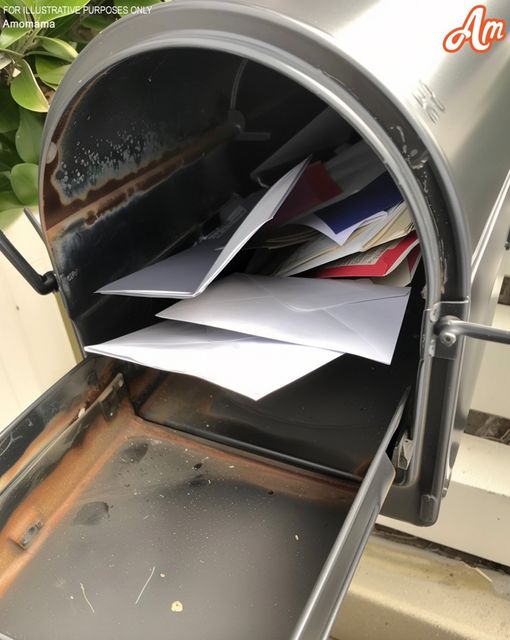When my ten-year-old daughter became oddly obsessed with checking the mailbox, I thought it was just a phase. But what I discovered hidden in those letters left me in tears and revealed a secret that changed our lives forever. And I couldn’t be more happy
Hi, I’m Erin, a 40-year-old single mom who adores her daughter, Lily. We’ve been a tight-knit duo since her dad passed away three years ago. Lily is my world: bright, curious, and full of life. Our evenings are usually filled with laughter, homework, and stories.
I work from home as a freelance graphic designer, which lets me spend a lot of time with her. It’s not always easy, but we’ve made a good life for ourselves.
One evening, as we finished dinner, Lily looked at me with those big, curious eyes of hers. “Mom, can I check the mailbox?” she asked out of the blue. It was unusual because she had never shown interest in our mail before. Normally, she’d be more excited about dessert or the latest episode of her favorite TV show.
“Sure, honey. Here’s the key,” I said, handing it over. Lily grabbed the key and dashed outside with a delighted smile. I watched her go, thinking it was just a whim.
The next day, she asked again. “Mom, can I check the mail?” she said, practically bouncing on her toes.
“Go ahead, Lily,” I replied, handing her the key again. She sprinted to the mailbox like it was the most exciting part of her day. This continued every evening. By the fourth day, it had become a routine.
“Mom, is it okay if I check the mail again?” she asked, already reaching for the key.
“Of course,” I said, trying to hide my curiosity. “You seem to really enjoy this, huh?”
“Yep!” she said with a grin before running out the door.
I began to notice other changes in her behavior too. Lily, usually an open book, had started to act secretive. She was more withdrawn, spending long hours in her room, and her usual laughter-filled games had taken on a more somber tone.
“Lily, you okay?” I asked one afternoon when I found her sitting quietly in her room, staring out the window.
“Yeah, I’m fine,” she said, but her voice lacked its usual cheeriness.
Her questions became stranger, too. One evening, as I was tucking her into bed, she looked up at me with those big, thoughtful eyes.
“Mom, do you think people can talk through letters even if they don’t know each other well?” she asked.
“Of course, sweetheart,” I replied, brushing a strand of hair from her forehead. “People can form beautiful connections through letters.”
She nodded thoughtfully but said no more. The next morning, I saw her slipping something into her backpack before school.
“What’s that, Lily?” I asked, trying to sound casual.
“Oh, it’s just for a school project,” she said, flashing a quick smile before running out the door.
My curiosity was piqued, but I didn’t want to pry. Still, her behavior weighed heavily on my mind. By the seventh day, I couldn’t take it any longer. Lily was super protective of the mailbox, not letting me open it because it was “a secret,” which by that time really scared me.
“Lily, why won’t you let me check the mail?” I asked one morning as she got ready for school.
“It’s a secret, Mom,” she said, looking up at me with serious eyes. “But it’s a good secret, I promise.”
“Okay,” I said, trying to hide my concern. “I trust you, but you have to promise me you’re not hiding anything dangerous.”
She nodded earnestly. “I promise, Mom. It’s nothing bad.”
When she left for school, with a mix of trepidation and guilt, I opened the mailbox, expecting to find something alarming: perhaps a note from a stranger or some distressing letters.
But instead, what I saw left me in tears.
There were several carefully folded pieces of paper, each covered in Lily’s neat handwriting. As I unfolded the first one, I realized it was a letter addressed to Mrs. Thompson, our mailwoman.
Dear Mrs. Thompson,
I hope you’re doing okay. I know you must be feeling very sad without your daughter. I want you to know that I’m here if you need someone to talk to. My mom says people can make friends through letters, and I think that’s true. Love, Lily.
Tears blurred my vision as I read the heartfelt words. I continued to read more letters, each one filled with warmth and compassion, sharing little anecdotes from Lily’s day, drawing pictures, and offering comfort.
Another letter read:
Dear Mrs. Thompson,
Today at school, we learned about butterflies. Did you know they can see colors we can’t? I thought that was cool. I drew a picture of one for you. I hope it makes you smile.
Love, Lily.
And another:
Dear Mrs. Thompson,
I baked cookies with my mom yesterday. They turned out really good! I wish I could share some with you. I hope you had a good day.
Love, Lily.
Among the letters, I found one from Mrs. Thompson:
Dear Lily,
Thank you for your sweet letters. They bring a little light into my day. Losing my daughter has been the hardest thing I’ve ever faced, but knowing that someone as kind as you cares makes it a bit easier. I’m grateful for your friendship.
Warmly, Mrs. Thompson.
I sat down on the porch steps, clutching the letters to my chest. My heart swelled with pride and sorrow. Lily had sensed Mrs. Thompson’s pain and reached out in the only way she knew how: through kind words and a compassionate heart.
That evening, when Lily asked to check the mailbox, I handed her the key with a smile. “You know, Lily, you have the biggest heart of anyone I know.”
She looked at me, surprised but pleased. “Thanks, Mom.”
As she ran out to the mailbox, I followed her, wanting to be a part of this beautiful connection she had formed. After some hesitation, she agreed. Together, we found another letter from Mrs. Thompson, and Lily read it aloud, her eyes shining with joy.
Dear Lily,
Your drawing of the butterfly was beautiful! It made my day. Thank you for sharing your cookies story. It reminded me of when I used to bake with my daughter. You have such a kind heart.
Your friend, Mrs. Thompson.
Lily beamed at me. “Mom, I think Mrs. Thompson likes my letters.”
“She does, sweetheart,” I replied, hugging her tightly.
In the days that followed, I encouraged Lily’s correspondence with Mrs. Thompson. We even invited her over for tea one afternoon. When she arrived, I could see the nervousness in Lily’s eyes, but she quickly relaxed as Mrs. Thompson enveloped her in a warm hug.
“Thank you for inviting me, Erin. It means a lot,” Mrs. Thompson said, her voice filled with emotion.
“Of course, Mrs. Thompson. We’re happy to have you,” I replied.
Lily brought out the cookies she had baked, proudly offering them to Mrs. Thompson. “I made these just for you!”
Mrs. Thompson took a bite and smiled. “These are delicious, Lily. You have a real talent.”
As the afternoon went on, the three of us talked and laughed, sharing stories and enjoying each other’s company. It was a simple yet profound moment of connection.
“Lily, do you want to show Mrs. Thompson your butterfly drawing?” I suggested.
Lily nodded eagerly and ran to fetch her drawing. When she returned, Mrs. Thompson’s eyes filled with tears as she looked at the colorful butterfly.
“It’s beautiful, Lily. Thank you,” she said softly.
Lily grinned. “I’m glad you like it.”
Watching Lily and Mrs. Thompson talk and laugh, I realized how much a simple act of kindness could mean. It was a reminder that even in our smallest actions, we have the power to make a profound difference in someone’s life.
Later that evening, as Lily and I sat on the porch, she looked up at me and said, “Mom, do you think we’ll always be friends with Mrs. Thompson?”
“I think so, Lily. You’ve shown her so much kindness and love. Those are the things that make friendships last,” I replied.
Lily smiled, content. “I’m glad. I like making people happy.”
“You have a special gift, Lily. Never forget that,” I said, hugging her close.
As the sun set, painting the sky in shades of pink and orange, I felt a deep sense of gratitude.
Lily taught me a valuable lesson: that even in the most unexpected ways, we can form meaningful connections and touch each other’s lives. And sometimes, the simplest acts of kindness can create the most beautiful bonds.

